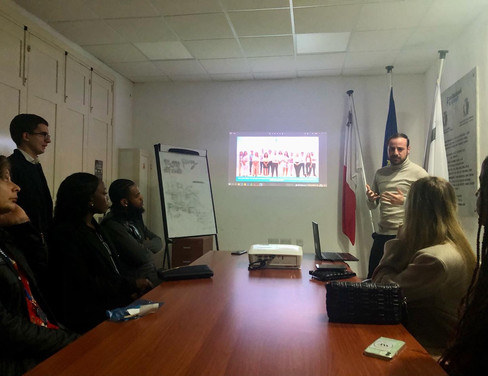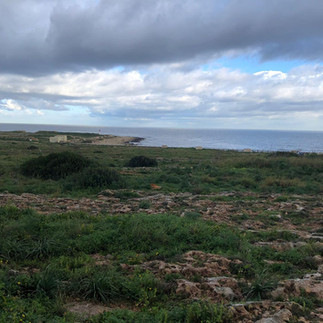Commonwealth Youth Exchange Participants convene in Malta
- Anna Byakika

- Feb 14, 2023
- 4 min read
Updated: Feb 15, 2023
On Wednesday 11th January, I travelled with five other participants from across the UK, passionate about social action, to Tas Sliema, Malta on a residential programme as part of the Commonwealth Youth Exchange Programme (a partnership between the Royal Commonwealth Society (RCS) and Clarion Futures). Clarion Housing Group’s charitable foundation, Clarion Futures, is transforming lives and improving communities delivering one of the UK’s biggest social investment programmes.
As part of the Commonwealth Youth Exchange Programme (CYEP) we have been working closely our counterparts in Malta (another six young leaders) to deliver projects that will positively impact our Commonwealth environment and strengthen our communities. My groups project is seeking to influence public policies and regulations around eco-friendly sustainable travel and greener housing. The CYEP is an important opportunity and journey to each of us because we are learning and displaying that working on a small, local scale can influence global and national policies.
On arrival in Malta, we met Nathan McKenzie, RCS Chief Operating Officer and Geraldine Noel, RCS Malta Branch lead who reminded us of the importance of this journey.
The programme began at the Malta Youth Council where CYEP participants and Youth Council Members, Jacob Callus (Advocacy Officer) and Yacopo Baldacchino (President) outlined the aims, work and some of the campaigns that the Council had recently been involved in.
This was followed by a meeting with representatives from the Office of the Minister, Ministry for Social and Affordable Housing. We discussed the recent expansion of private homeownership, hidden homelessness, the important term ‘roofless’ and the environmental effects of construction sites. I learnt hidden homelessness is an individual without a home, who is staying with family and friends, sofa surfing or living in unsuitable housing and may not be rough sleeping or declared homeless. A few Maltese participants shared that although we may not see homelessness in the form of rough sleeping, this does not mean people are not facing homelessness.
Before lunch in Mdina our group stopped off at the Dingli Cliffs, the highest point on the Maltese islands, offering a stunning panoramic view!

Onto the University of Malta and a lecture from Dr Rachael Scicluna on social housing and urban planning. This was particularly helpful in light of my group’s green housing project, Sows Seeds Urban. The Professor also kindly recommended Leslie Kern’s Feminist City, to further our own learning on innovative housing models, urban planning that prioritise people and modern social dynamics. This is helpful in making the accommodation sector accessible.
Once back at the hotel each of us had the chance to revisit our social action projects, critically assess our plans and catch up since we met last year at Cumberland Lodge, Windsor.
Day two began at the Pembroke nature reserve. This was an opportunity to visit and discuss the green landscape of Malta with Vincent Attard CEO of Nature Trust, FEE Malta. The dedicated volunteers there are working on habitat restoration projects and are seeking to grow more local protected trees. They are also delivering a series of educational workshops for young students; this helps local families understand the damage of litter and vandalism. On our visit, a few participants took part in an impromptu litter pick-up at the nature reserve and we all hope to support with this in the future.
Onto the British High Commission, where we had the opportunity to meet with Tristan Gilchrist, Deputy High Commissioner and other members of his team to discuss our social action, learn about the work of the High Commissioner and also had the chance to hear from a representative of the Commonwealth War Graves Commission in Malta.

After a fantastic morning, we met His Excellency Dr Geroge Vella KOM KCMG, President of the Republic of Malta at the San Anton Palace. I was enlightened to discuss the President’s political journey, background and receive empowering advice about maintaining hope and a strong work ethic. Our collective aim remains to raise awareness of climate and environmental issues locally, support changes in individual action and highlight implications of high-carbon lifestyles and carbon intensive activities.
The contribution of local people is indispensable; this was a key theme throughout our entire trip. A dedicated team gave a tour of the Verdala Palace, a 16th century building overlooking the island. The interior of the palace is very ornate, with frescoes and an example of renaissance architecture. The team also showed us around the Verdala Palace rehabilitation project, Malta’s commitment to The Queen’s Commonwealth Canopy, where they are working to rehabilitate and preserve the existing woodland area of approximately 6.8 hectares.
On Saturday, we embarked on a tour of the megalithic stone temples at UNESCO World Heritage Sites. The prehistoric monumental buildings constructed during the 4th millennium BC and the 3rd millennium BC rank amongst the earliest free-standing stone buildings in the world and are incredibly remarkable. Each monument is believed to be prearranged and built using sophisticated construction techniques. This led to many insightful conversations about geology, prehistoric culture and historic preservation. As part of our cultural visit programme to the island of Gozo, arranged by the Malta Tourism Authority we were also treated to a Maltese lunch feast!
On the last day of our trip we visited Valletta, the capital city of Malta. Many of us were left stunned by the history and cultural and architectural influences from Sicilian, Arabic, and Baroque customs. Many of us dispersed eagerly trying to capture and document the beauty of the entire city. We experienced a traditional boat ride and local residents shared that a diverse group of Maltese people from socio-economic backgrounds live and access the waterfront. Some residents attend science school and public ceremonial events between the Three fortified Cities of Malta: Vittoriosa, Senglea and Cospicua.
I consider it a privilege to come together, learn and organise to advance our social action efforts with the support of the Royal Commonwealth Society and Clarion Futures.
A few of my trip highlights:
- Meeting with the President, British High Commission and the Youth Exchange Participants
- Seeing the Mediterranean sea, nature reserve and marine life Maltese housing system
- Informative tour of Neolithic era at UNESO World Heritage Site
- Social housing and Urban Planning Lecture at University of Malta
- Speaking to local residents about their lived experiences and Maltese history



















































